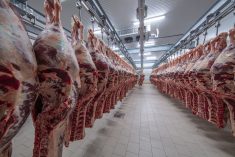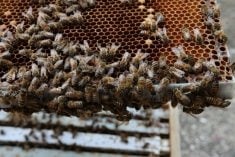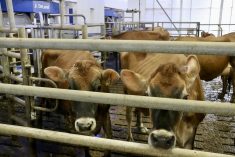Frankfurt | Reuters — Bayer, the German drugmaker that bought U.S. seed company Monsanto, announced on Thursday the sale of its animal health business and a number of others, around 12,000 job cuts and 3.3 billion euros (C$4.98 billion) in impairments.
CEO Werner Baumann is under pressure to boost Bayer’s share price after a drop of more than 35 per cent so far this year, dragged down by concern over more than 9,000 lawsuits it faces over an alleged cancer-causing effect of Monsanto’s Roundup herbicide.
Read Also

Mexico agriculture secretary says still no date for restarting cattle exports to U.S.
Mexican Agriculture Minister Julio Berdegue said on Wednesday that Mexico and the United States have not yet set a date to resume Mexican cattle exports amid an outbreak of the flesh-eating screwworm parasite.
The group said it was looking at options — that could include a sale — for the Coppertone sunscreen and Dr. Scholl’s foot care products from the consumer healthcare division it bought from Merck + Co. in 2014 for US$14 billion.
It will also divest its animal health division, the number five player in the industry, which analysts have said could fetch six billion to seven billion euros (C$9 billion-$10.6 billion).
The unit, the largest maker of flea and tick control products for cats and dogs and a supplier of livestock veterinary drugs, had sales of 1.57 billion euros in 2017, accounting for about 4.5 per cent of group revenues.
There has already been consolidation in animal health, with Pfizer and Eli Lilly, successfully floating their veterinary medicine units on the stock market as independent entities.
Bayer ranks fifth in veterinary medicine, behind Zoetis, the former Pfizer unit, Elanco, unlisted Boehringer Ingelheim, which acquired animal health assets from Sanofi, and drugmaker Merck.
Bayer will also seek a buyer for its 60 per cent stake in German chemical production site services provider Currenta.
All three possible transactions were previously flagged by Reuters.
Markus Mayer, an analyst at Baader Helvea, said Coppertone and Dr. Scholl’s could fetch one billion euros and the Currenta stake could fetch 1.5 billion euros.
Reckitt Benckiser and Procter + Gamble Co. will likely be among the suitors for the consumer brands, said investment bankers, who asked not to be named.
Job cuts
Under a cost cutting program that will also target synergies expected from the US$63 billion acquisition of Monsanto, Bayer will cut around 12,000 of its 118,200 jobs worldwide.
At the consumer health and pharmaceuticals divisions, Bayer will take about 3.3 billion euros in impairments and write-offs the fourth quarter.
Consumer health brands acquired with the Merck and Dihon businesses will account for 2.7 billion euros of that, while about 600 million euros impairments and write-offs are due to a decision not to utilize a haemophilia drug factory in the German city of Wuppertal and to concentrate production in Berkeley, California.
The consumer healthcare unit, which sells non-prescription treatments, has faced falling revenues as U.S. consumers went from established drugstores to online shops, often switching to cheaper brands.
In the first nine months of 2018, Bayer consumer health products’ sales declined by 0.4 per cent when excluding currency swings, following a drop of 1.7 per cent in the full year of 2017.
The company said it was targeting core earnings per share of 6.80 euros in 2019, up from an expected 5.70 to 5.90 euros this year, with a 2022 target of around 10 euros, when discounting the effect of currency swings and portfolio changes.
The group’s margin of earnings before interest, taxes, depreciation and amortization (EBITDA) and special items over sales should increase to over 30 per cent by 2022, up from 26.5 percent last year, it added.
— Ludwig Burger is a Reuters correspondent covering the European pharma and chemical sectors from Frankfurt; additional reporting by Arno Schuetze.












